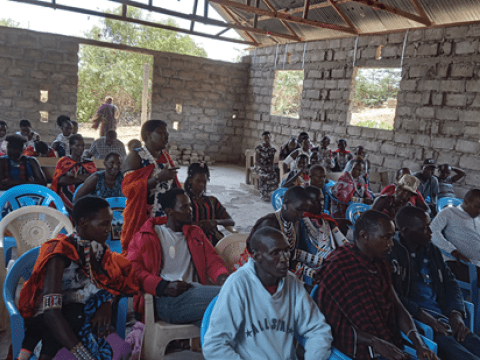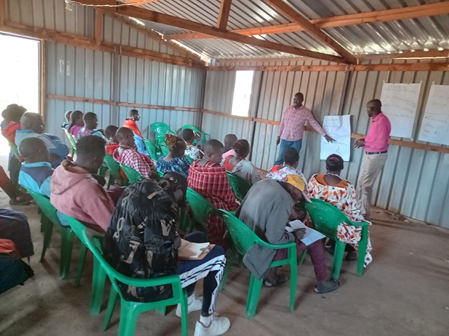From Voices to Action: How Kenyan Communities Are Leading Local Climate Action

In the arid and semi-arid lands of Kajiado and Narok counties in Kenya, communities are reshaping how climate action is practiced — not by waiting for change, but by driving it themselves. Through the Sustainable Environment and Economy against Drought and Degradation in the Tsavo Ecosystem and Dispersal Area Project (K-SEED, 2023–2027), funded by the Korea International Cooperation Agency (KOICA) and implemented by World Vision Korea and World Vision Kenya, local citizens are emerging as key actors in climate governance and accountability.
At the heart of this transformation is Citizen Voice and Action (CVA) — World Vision’s social accountability approach that equips citizens to constructively engage with government, influence public policy, and advocate for improved services that reflect their priorities. Specific guidance for using CVA for climate action and environmental management is available here.
Building Resilience in Climate-Vulnerable Communities
Kajiado and Narok counties are highly vulnerable to climate impacts such as droughts and floods. The livelihoods of communities here depend heavily on natural resources — including water, pasture for livestock, and forests — which are under increasing pressure due to climate change. The K-SEED project supports these communities by enhancing their climate resilience through a combination of interventions. These include capacity building in natural resource management, promotion of climate-smart agriculture, and access to microfinance for sustainable livelihoods.
Crucially, beyond technical training, the project empowers communities through the CVA approach to hold duty-bearers accountable and ensure public policies align with local needs and realities. With policy change, communities will gain stronger leverage to influence decisions that improve natural resource management. To ensure linking community’s restoration work with policy engagement, CVA groups are represented by local leaders and community group members who actively practice regreening techniques such as FMNR and Climate Smart Agriculture. CVA offers a sustainable framework for long-term citizen engagement with government systems — even beyond the lifespan of the project.
From Awareness to Action
Since its inception in 2023, the K-SEED project has established or strengthened 20 CVA groups — 12 in Kajiado and 8 in Narok — reaching 227 members (144 men and 83 women). These members received training in constitutional rights, county planning and budget cycles, public participation processes, and how to draft and submit policy proposals.

As an example, leaders of groups in Narok County used the CVA approach to analyse the Narok County Draft FY2024/2025 budget and revealed key gaps in allocation of funds. The Environment, Energy, Water, Natural Resources & Climate Change sector was allocated 4.1% out of the 17.2 billion entire county budgets. Via a memorandum to the county, they proposed an increment to 5% of the overall budget with progressive estimated increase to 6% and 7% during the projected FY 2026-27 and FY 2027-28 respectively. In 2024, seven CVA groups submitted climate-related policy proposals to their respective county governments. These proposals highlighted local climate priorities and presented actionable solutions.
Community Priorities: Policy Proposals in Focus
When the Citizen Voice and Action (CVA) groups in Kajiado and Narok began identifying the most pressing climate issues affecting their daily lives, two challenges stood out above the rest: widespread charcoal burning and tree cutting, and the increasing scarcity of water due to recurrent droughts.
In villages across the region, community members shared stories of how forests were disappearing — felled for fuel and charcoal production — leaving the land exposed and vulnerable to erosion. In response, the CVA groups called on county governments to take action. Their proposals urged for budget allocations to support the distribution of clean cookstoves and to bolster the enforcement of environmental conservation laws. The goal was simple but critical: reduce reliance on charcoal, protect remaining forests, and promote more sustainable household energy use.
At the same time, the looming threat of drought weighed heavily on the minds of pastoralists, farmers, and families. Even though county development plans acknowledged the issue, funding commitments were often vague or insufficient. CVA members pushed for greater transparency and stronger budgetary support — specifically for food relief during drought periods and for drilling boreholes to secure water access throughout the year.
These efforts have not gone unnoticed. In one encouraging example, Narok County responded directly to a CVA proposal by distributing 660 tree seedlings to six schools and communities — a small but meaningful step toward reforestation and environmental recovery. It’s a testament to what can happen when citizen advocacy is matched with government responsiveness: local voices begin to shape policies that reflect local realities.
Shifting Power Through Participation
A central strategy of CVA groups has been the strategic use of public participation platforms within the county budget process. Rather than being passive recipients of policy decisions, citizens are becoming active contributors. And their efforts are already changing how local governments engage with communities.
“The K-SEED project’s Citizen Voice and Action has raised our awareness of climate change impacts. We are now actively advocating for stronger policies that promote climate action and good governance to protect our community and environment.”
— Thomas Lesumug, Leader, Enchorro-Ekule CVA Group
“What started as a local discussion led us to the county government. We now see our suggestions reflected in actual plans.”
— Lenny Lengete, Pastoralist Climate Action CVA Group Toward Citizen-Led Climate Governance
Looking ahead, the K-SEED project is helping build the foundations for long-term, citizen-led climate governance. Although Kenya’s national and county development visions highlight climate change as a priority, there is often a gap between policy goals and implementation. The CVA approach helps bridge this gap by creating structured processes through which local concerns are integrated into government development plans and budgets.
Importantly, CVA also serves as a platform for inclusive participation. With 83 women among the trained CVA members, the project ensures that advocacy reflects the diverse perspectives within the community — helping to shift power dynamics and elevate the voices of traditionally marginalised groups.
The K-SEED project is not just about planting trees — it's about changing systems. By strengthening the relationship between citizens and government, and by placing communities at the centre of climate decision-making, the project offers a powerful model for resilience and equity. It demonstrates what’s possible when development partners like KOICA, NGOs, and local communities work hand in hand to create a climate-smart, accountable future.
📩 For more information, contact:
Samwel Oyomo (Advocacy Officer, K-SEED Project)
samwel_oyomo@wvi.org